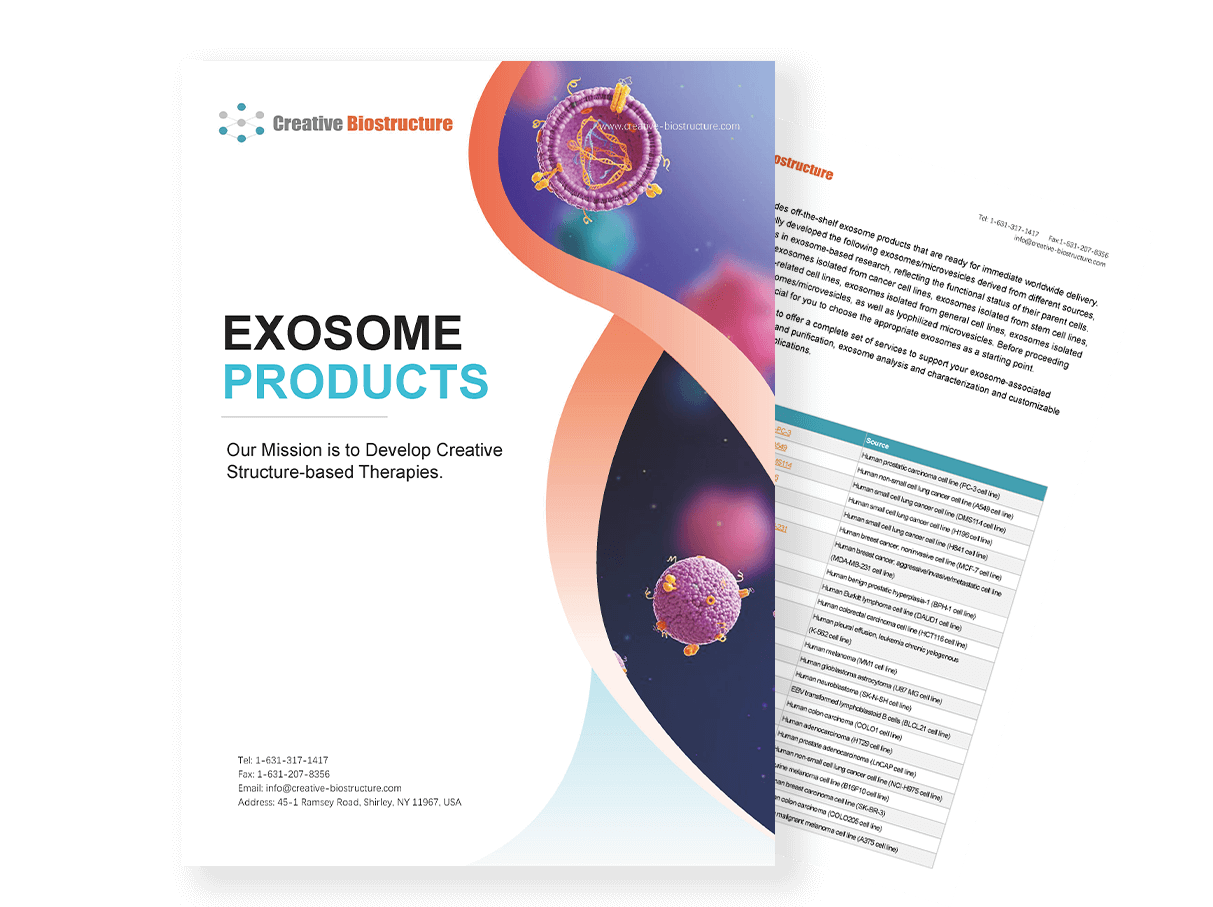Exosome Modification Omics Analysis Service
To uncover the intricate dynamics of intercellular communication and the underlying molecular mechanisms, Creative Biostructure offers comprehensive exosome modification omics analysis services. Our advanced methodologies, including high-throughput sequencing and mass spectrometry, enable detailed examination of modifications such as phosphorylation, glycosylation, and ubiquitination on exosome molecules.
What Is Exosome Modification Omics?
Exosome modification omics is a cutting-edge research field focused on the comprehensive analysis of post-translational modifications (PTMs) and other molecular alterations within exosomes. This includes examining the types, locations, and levels of modifications on proteins, nucleic acids, and lipids carried by exosomes. It aims to elucidate how these modifications influence the function and activity of exosome molecules, which is pivotal for understanding intercellular communication, disease diagnosis, and the development of targeted therapeutics. This approach holds significant potential for uncovering novel biomarkers and therapeutic targets, revolutionizing the landscape of precision medicine.
The Importance of Exosome Modification Omics Analysis
- Understanding Intercellular Communication: Exosomes are key mediators of intercellular communication as they deliver proteins, nucleic acids, and lipids between cells. Understanding the modifications of these molecules helps elucidate the mechanisms and efficacy of this communication. Molecules within or on the surface of exosomes can undergo various modifications (e.g., phosphorylation, glycosylation), which can significantly impact their functions and the effectiveness of their delivery.
- Advanced Molecular Profiling: High-throughput sequencing and mass spectrometry offer detailed molecular modification profiles within exosomes. These analyses reveal how modifications influence molecular properties and exosome biology.
- Disease Diagnosis: Modified molecules in exosomes can serve as biomarkers for early diagnosis and prognosis evaluation of diseases. For instance, exosomes derived from tumor cells carry specific miRNAs that are stable and easily preserved, serving as markers for early diagnosis of cancers like pancreatic and colorectal cancer.
- Therapeutic Applications: In-depth study of exosome modification omics can help identify potential drug targets, aiding in the development of novel therapeutic strategies.
Exosome Modification Omics Analysis at Creative Biostructure
Our exosome modification omics analysis focuses on identifying and analyzing various molecular modifications in exosomes, including but not limited to phosphorylation, glycosylation, ubiquitination, and methylation. These modifications can alter molecular structure, stability, and function, thereby affecting the overall biological effects of exosomes.
Our Comprehensive Analysis Approaches
High-Throughput Sequencing
Nucleic Acid Modifications: We use cutting-edge high-throughput sequencing techniques to analyze modifications in nucleic acids within exosomes, providing insights into their roles in gene regulation and disease.
Mass Spectrometry
Proteomic Analysis: Our mass spectrometry services offer precise identification and quantification of modified proteins in exosomes, helping to pinpoint critical functional changes.
Immunoblotting
Protein Validation: We employ immunoblotting techniques to validate the presence and modification status of key exosome-associated proteins, ensuring accurate and reliable results.
Workflow of Exosome Modification Omics Analysis
Briefly describe our workflow with an example of phosphoproteomics analysis in extracellular vesicles (EVs):
 Figure 1. The workflow for EVs phosphoproteomics. (Chen I H, et al., 2017).
Figure 1. The workflow for EVs phosphoproteomics. (Chen I H, et al., 2017).
1. EV Isolation: Microvesicles and exosomes are isolated from customer-provided samples using sequential centrifugation techniques.
2. Protein and Peptide Processing: Proteins within EVs are extracted, and peptides are generated using trypsin, enhanced by phase-transfer surfactants.
3. Phosphopeptide Enrichment: Key peptides with phosphorylation modifications are selectively enriched for detailed analysis.
4. Mass Spectrometry Analysis: The enriched phosphopeptides are analyzed using high-resolution LC-MS/MS to identify and quantify them.
5. Quantitative Assessment: Differential phosphorylation events are quantified using label-free methods to compare disease and healthy states.
6. Biomarker Identification: Data analysis pinpoints potential biomarkers, focusing on phosphoproteins with significant changes in disease conditions.
7. Validation: Potential biomarkers are validated using targeted mass spectrometry techniques such as PRM for accuracy.
With our extensive project experience in the field of exosomes, Creative Biostructure offers customers accurate and comprehensive data support to ensure the most satisfactory results. If you are interested in our services, please contact us for a detailed quote.
Key Advantages of Our Services
- Comprehensive Expertise: With extensive project experience, we provide precise and thorough data support. We offer personalized quotes and ensure you receive the best service.
- Advanced Techniques: Isolating exosomes from customer samples using advanced centrifugation methods. Employing state-of-the-art methodologies for pinpointing modifications within exosomes.
- Exceptional Data Accuracy: Ensuring that our analytical results are reliable and exhaustive for all research needs.
- Customized Solutions: Providing exosome modification analysis that aligns with specific research requirements. From initial consultation to final data interpretation, we help achieve your research goals.
Resources
Frequently Asked Questions
-
What types of exosome modifications can your service detect?
We can detect a wide range of exosome modifications, including but not limited to phosphorylation, glycosylation, ubiquitination, and methylation. Our multi-faceted approach utilizes high-throughput sequencing, mass spectrometry, and immunoblotting to provide comprehensive analysis.
-
How sensitive and specific is your exosome modification proteomics analysis in detecting low-abundance biomarkers?
Our service is highly sensitive, capable of detecting and quantifying low-abundance PTMs with precision. We utilize state-of-the-art mass spectrometry instruments and optimized protocols to ensure the detection of even minor changes in exosome protein modifications.
-
How do you ensure the confidentiality and security of our research data?
We prioritize the confidentiality and security of our clients' research data. All data are stored securely with access limited to authorized personnel only. We adhere to strict data protection policies and can sign confidentiality agreements as required by our clients.
Ordering Process
References
- Chen I H, Xue L, Hsu C C, et al. Phosphoproteins in extracellular vesicles as candidate markers for breast cancer. Proceedings of the National Academy of Sciences. 2017. 114(12): 3175-3180.
- Leutert M, Entwisle S W, Villén J. Decoding post-translational modification crosstalk with proteomics. Molecular & Cellular Proteomics. 2021, 20.
- Bagwan N, El Ali H H, Lundby A. Proteome-wide profiling and mapping of post translational modifications in human hearts. Scientific Reports. 2021. 11(1): 2184.
 Exosome Solutions for Your Proceeding Research
Exosome Solutions for Your Proceeding Research
 Exosomes Products
Exosomes Products Exosome Characterization
Exosome Characterization Custom Nano-Flow Cytometry Analysis
Custom Nano-Flow Cytometry Analysis
